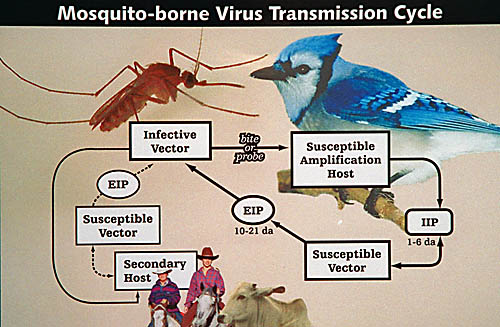Mosquito transmitted diseases have been in the news lately. While these diseases are not new, it is always good to review what we can do to minimize the risk of mosquito-vectored diseases for the safety of equines such as horses, donkeys and mules as well as ourselves.
Protect Yourself and Equines from Mosquito Transmitted Disease
It all starts with reducing elements in the environment that may breed mosquitos. Anything that collects stagnant water is a potential breeding site for mosquitos. Removing these mosquito habitats can effectively reduce populations. Untended birdbaths or pet watering bowls can breed mosquitos the same as old tires. Frequent cleaning and water changing drastically reduces opportunities for mosquitos to reproduce.
Even when we reduce mosquito breeding areas, there will still be mosquitos in our environment when weather conditions favor them. Protecting your animals and yourself with barriers of clothing or fly sheets can help minimize mosquito bites. Chemical repellents combined with barriers greatly increases protection for both animals and humans.
For all the equines, vaccinations against most mosquito transmitted disease are very effective and have been in use for over fifty years. With mosquito season right around the corner, now is the time to take action to protect horses, donkeys, mules and people. Please visit the following websites for more information.

Below you will find links with more information on protecting yourself and equines from Mosquito Transmitted Diseases.
Here is a link to UF/IFAS EDIS publications about mosquito control and diseases.
Here is a link to UF/IFAS equine health information.
If you have any pasture or livestock questions relating to Levy County please feel free to contact Ed Jennings, UF/IFAS Extension Director for Levy County at (352) 486-5131 or by email at edjennin@ufl.edu.
Here is the link to the Centers for Disease Control (CDC) website with
 0
0
 Protect Yourself and Equines from Mosquito Transmitted Disease
Protect Yourself and Equines from Mosquito Transmitted Disease